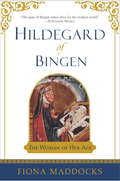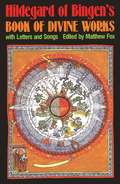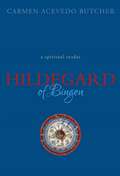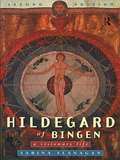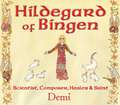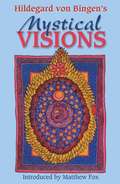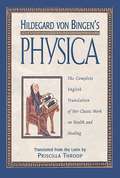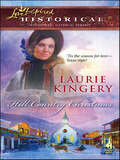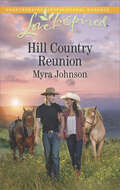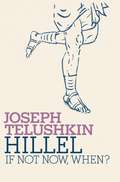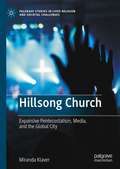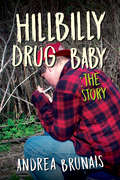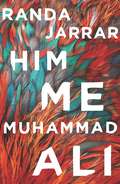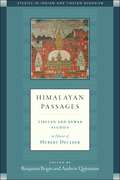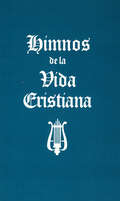- Table View
- List View
Hildegard of Bingen
by Fiona MaddocksThe twelfth-century German abbess Hildegard of Bingen would have been remarkable in any age. Today, her growing reputation as a composer of religious music has overshadowed the astonishing variety of her accomplishments and her part in the scientific, cultural, and theological revolution of the pre-Renaissance, from religion and mysticism to medicine and sex. Scivias, her book of apocalyptic visions, with its extraordinary and compelling illustrations, would alone have been enough to endure her lasting fame.The story of Hildegard's life, from her entry into a monastery at Disibodenberg on the Rhine as a child, through the exploration of her pent-up genius in middle years, to her eventual admission to the German canon of saints, is here told against a rich background of the years of the Crusades, the flowering of monasticism, papal schism and heresy. The forceful character that emerges challenges any image of demurely subjugated womanhood associated with the period. Hildegard's story is as fascinating as that of any figure in the Middle Ages, and she and her musical legacy continue to be the subject of debate a thousand years later.From the Hardcover edition.
Hildegard of Bingen and Musical Reception
by Jennifer BainSince her death in 1179, Hildegard of Bingen has commanded attention in every century. In this book Jennifer Bain traces the historical reception of Hildegard, focusing particularly on the moment in the modern era when she began to be considered as a composer. Bain examines how the activities of clergy in nineteenth-century Eibingen resulted in increased veneration of Hildegard, an authentication of her relics, and a rediscovery of her music. The book goes on to situate the emergence of Hildegard's music both within the French chant restoration movement driven by Solesmes and the German chant revival supported by Cecilianism, the German movement to reform Church music more generally. Engaging with the complex political and religious environment in German speaking areas, Bain places the more recent Anglophone revival of Hildegard's music in a broader historical perspective and reveals the important intersections amongst local devotion, popular culture, and intellectual activities.
Hildegard of Bingen's Book of Divine Works: With Letters and Songs
by Matthew FoxHildegard of Bingen, a Rhineland mystic of the twelfth century, has been called an ideal model of the liberated woman. She was a poet and scientist, painter and musician, healer and abbess, playwright, prophet, preacher and social critic. The Book of Divine Works was written between 1170 and 1173, and this is its first appearance in English. The third volume of a trilogy which includes Scivias, published by Bear & Company in 1985, this visionary work is a signal resounding throughout the planet that a time of healing and balance is at hand. The Book of Divine Works is a cosmology which reunites religion, science, and art, and readers will discover an astonishing symbiosis with contemporary physics in these 800-year-old visions. The present volume also contains 51 letters written by Hildegard to significant political and religious figures of her day and translations of twelve of her songs.
Hildegard of Bingen: A Spiritual Reader
by Carmen Acevedo Butcher"Humanity, take a good look at yourself. Inside, you've got heaven and earth, and all of creation. You're a world – everything is hidden in you." –Hildegard of Bingen She was a Benedictine abbess, artist, composer, dietician, naturalist, poet, travelling preacher, mystic, and political consultant. She was a self-doubter with acute certainty in a merciful and mysterious God; a gifted healer who suffered from illness her whole life. Meet the incomparable Hildegard of Bingen. Nourishing, challenging, and idea-bursting, her writings will stir and awaken your soul. This essential reader captures the vibrant spirit and intelligence of Hildegard with selections from her songs, theological texts, liturgical music, and letters. Combined with an introduction to Hildegard's life and era, a map of Hildegard's Germany, chronology, and a thorough bibliography/discography, Hildegard of Bingen provides the ideal introduction to the thought of this fascinating medieval mystic.
Hildegard of Bingen: A Visionary Life
by Sabina FlanaganDrawing on contemporary sources, the text unfolds Hildegard's life from the time of her entrance into an anchoress's cell--where a woman would remain in pious isolation--to her death as a famed visionary and writer, abbess and confidante of popes and kings, more than seventy years later. Against this background the author explores Hildegard's vast creative work, encompassing theology, medicine, natural history, poetry, and music.
Hildegard of Bingen: Scientist, Composer, Healer, and Saint
by DemiHildegard of Bingen (1098-1179) was one of the most remarkable and influential women of her time. Blessed with an astonishing array of talents, she was at once a mystic, theologian, scientist, doctor, nutritionist, composer, writer, linguist, and artist. Born to a noble family in Mainz, Germany, Hildegard entered a Benedictine monastery and went on to become abbess of a thriving community near Bingen. From a young age she received extraordinary &“lights&” or visions of Heaven, which she described in a book called Know the Ways (of God). Hildegard&’s collection of imaginative music and poetry includes seventy-seven songs for the liturgical year and a morality play, making her the most prolific composer of early music in Europe. Her pioneering scientific work formed the basis for the study of natural history in Germany, while her holistic medical studies helped to provide cures for numerous diseases. Hildegard was also the author of a cookbook recommending nutritional &“foods of joy&” and she even invented a new language! Such was Hildegard&’s fame and influence that bishops, popes, and kings, as well as humble peasants, sought out her wise counsel. Today, Hildegard of Bingen is recognized as a saint and doctor by the Catholic Church and is also revered by many Lutherans and other Protestants. Find out more about her life in this beautifully illustrated book by award-winning author, Demi.
Hildegard of Bingen: Selected Writings
by Mark Atherton Hildegard Of BingenBenedictine nun, poet and musician, Hildegard of Bingen (1098-1179) was one of the most remarkable figures of the Middle Ages. She undertook preaching tours throughout the German empire at the age of sixty, and was consulted not only by her religious contemporaries but also by kings and emperors, yet it is largely for her apocalyptic and mystical writings that she is remembered. This volume includes selections from her three visionary works, her treatises on medicine and the natural world, her devotional songs, and fascinating letters to prominent figures of her time. Dealing with such eternal subjects as the relationship between humans and nature, and men and women, Hildegard's works show her to be a wide-ranging thinker who created such fresh, startling images and ideas that her writings have been compared to Dante and Blake.
Hildegard von Bingen (Le leggendarie donne della storia mondiale #11)
by Laurel A. RockefellerArmata di penna e calamaio, riscrisse la storia del cristianesimo medievale. Hildegard von Bingen non era destinata a passare alla storia. Decima figlia di uno del vassalli del conte von Sponheim, era stata donata dai genitori al monastero di Disibodenberg in segno di gratitudine a Dio, ma soprattutto perché, a causa delle sue visioni, sarebbe stato difficile darla in sposa ad un buon partito. Quando succedette a Jutta von Sponheim nel ruolo di Magistra e priora di Disibodenberg, mantenere il segreto riguardo alle sue visioni divenne impossibile. Quanto accadde in seguito, sconvolse non solo la vita monastica per le donne del suo ordine, ma l'intera storia mondiale. Scopri la storia della scrittrice più prolifica del Medioevo, la leggendaria Hildegard von Bingen.
Hildegard von Bingen's Mystical Visions: Translated from Scivias
by Matthew Fox Bruce HozeskiTwelfth-century Rhineland mystic Hildegard von Bingen records her exquisite encounter with divinity, producing a magnificent fusion of divine inspiration and human intellect. Hildegard von Bingen’s Mystical Visions is perhaps the most complete and powerful documentation of mystical consciousness in recorded history. Now after 800 years, these visions are again available for those seeking to reawaken mystical consciousness.
Hildegard von Bingen's Physica: The Complete English Translation of Her Classic Work on Health and Healing
by Priscilla ThroopOne of two major medical treatises by medieval healer Hildegard von Bingen, presented in its entirety for the first time in English during the 900th anniversary of her birth. • A seminal text in the development of Western herbal medicine • Presents nine categories of healing systems--Plants, Elements, Trees, Stones, Fish, Birds, Animals, Reptiles, and Metals--and elaborates on their medicinal use • Closely related to Eastern medical approaches that are gaining respect today Saint, mystic, healer, visionary, fighter, Hildegard von Bingen stands as one of the great figures in the history of women in me. At a time when few women could write and most were denied a formal education, Hildegard von Bingen became a legendary healer, visionary, musician, artist, poet, and saint. Her works include twenty-seven symphonic compositions; Scivias, a compilation of her visions; and her two major medical works, Causae et Curae, a medical compendium, and Physica, published here in English in its entirety for the first time. Physica has a strong affinity with the Eastern medical approaches gaining great respect today. The modern reader interested in natural healing will recognize the enormous truth in the theories of this 12th-century physician, which remind us that our cures for illness depend on our natural world and our place in it.
Hildegard von Bingen: Versione per studenti e docenti (Le leggendarie donne della storia mondiale #11)
by Laurel A. RockefellerArmata di penna e calamaio, riscrisse la storia del cristianesimo medievale. Hildegard von Bingen non era destinata a passare alla storia. Decima figlia di uno del vassalli del conte von Sponheim, era stata donata dai genitori al monastero di Disibodenberg in segno di gratitudine a Dio, ma soprattutto perché, a causa delle sue visioni, sarebbe stato difficile darla in sposa ad un buon partito. Quando succedette a Jutta von Sponheim nel ruolo di Magistra e priora di Disibodenberg, mantenere il segreto riguardo alle sue visioni divenne impossibile. Quanto accadde in seguito, sconvolse non solo la vita monastica per le donne del suo ordine, ma l'intera storia mondiale. Scopri la storia della scrittrice più prolifica del Medioevo, la leggendaria Hildegard von Bingen. L'edizione per studenti e docenti è corredata da domande d'approfondimento alla fine di ogni capitolo.
Hildreth 2in2 (Savannah From Savannah & Savannah Comes Undone)
by Denise Hildreth JonesThis 2 in 1 bundle by Denise Hildreth contains Savannah From Savannah and Savannah Comes Undone. Savannah from Savannah:I'm coming home to prove something..to my city, my mother, and myself. It is a place known to most as Savannah. It is a place known to me as home. I wish I could tell you it was my love for this city that precipitated my return. But I did not return out of a mere longing for home. I returned because I have something to prove to home. I am Savannah...from Savannah. Savannah Comes Undone:Seeing my mother as the lead story on the six o'clock news was no great cause for alarm...until the camera revealed her chained to a downtown monument!I thought I knew my mother-but right now I'm not sure I even know myself. I'm currently a journalist for the Savannah Chronicle. And I don't need drama. Really, I can create my own. Who needs extra? But in spite of the mind-boggling events in Savannah this week, the truth is going to be revealed by one of its very own. I am Savannah...from Savannah.
Hill Country Christmas
by Laurie KingeryHoliday HeiressOvernight, Delia Keller went from penniless preacher's granddaughter to rich young heiress. She's determined to use her money to find the security she's always lacked. And building herself a new house by Christmas is her first priority. But handsome Jude Tucker is challenging her plans and her heart....The former Civil War chaplain hasn't felt peace in a very long time, and he has a hard time letting go of his past. But as Jude gets to know the spirited Delia, he longs to show her what true Christmas joy means. In the rugged Texas Hill Country, he'll reach for a miracle to restore his faith...and give Delia his love for all seasons.
Hill Country Christmas & Her Captain's Heart: An Anthology
by Lyn Cote Laurie KingeryTwo inspiring stories of determination, courage…and loveHill Country ChristmasIn the rugged Texas Hill Country, Delia Keller went from penniless preacher’s granddaughter to rich young heiress. She’s determined to use her money to find the security she’s always lacked, and build herself a new house by Christmas. Former Civil War chaplain Jude Tucker longs to show her what true Christmas joy means. Can he restore his own faith and give Delia his love for all seasons?Her Captain’s HeartIdealistic schoolteacher Verity Hardy believes nothing is impossible. The lovely widow is certain teaching freed slaves in a Virginia town torn apart by the Civil War will help heal bitterness and old wounds. However, she’s finding that the school’s cynical builder, former Union captain Matthew Ritter, has little faith in her plan—or anything else. But Verity’s spirit and courage inspire him to fight for what he believes in…
Hill Country Courtship
by Laurie KingeryA Baby of Her Own Maude Harkey is resigned to a loveless life until a baby is born-and orphaned-at her boardinghouse home. She'll never be a wife...but she can still be a mother. Yet a boardinghouse is no place for a newborn. Enter Jonas MacLaren-a handsome, exasperating rancher with an offer too good to refuse. Jonas can handle running a ranch-but handling his cantankerous mother is another matter. Maude matches his mother's stubbornness so she'll be a perfect live-in companion. But she's there for his mother, not for him. He'll just have to keep his wounded heart closed to her beauty, her humor, her warmth and strength-and her irresistibly adorable baby. Brides of Simpson Creek: Small-town Texas spinsters find love with mail-order grooms!
Hill Country Redemption (Hill Country Cowboys #1)
by Shannon Taylor VannatterThis cowboy has one more chance to make it right…He already lost her once…Now he’s fighting for her—and their daughter. When Rance Shepherd takes a job stocking cattle for a local rodeo, he’s shocked that his new client is his ex-sweetheart, Larae Collins. Now he’s determined to prove to the single mother that he isn’t the restless cowboy she remembers. But when he discovers her little girl is his, they both must forgive past mistakes for a second shot at a future together.
Hill Country Reunion: A Man For Honor Hill Country Reunion The Lawman's Runaway Bride
by Myra JohnsonHope springs anew for a man and his Texas sweetheart. “Numerous heartfelt scenes combine with well-crafted characters” in the Hill Country series (RT Book Reviews).Veterinarian Tripp Willoughby returns to his hometown of Juniper Bluff knowing he has no right to ask for forgiveness. He thought keeping his Crohn’s disease a secret was the right thing to do—but he ended up breaking his college girlfriend’s heart. Now Diana Matthews has a new life running a cafe and working with animals. Reluctantly, she accepts his help with her pet therapy program. And as the furry animals bring them together, Tripp remembers how things used to be with Diana—and is convinced he must find a way to reveal the truth and win her back.
Hillel: If Not Now, When?
by Joseph Telushkin"What is hateful unto you, do not do unto your neighbor. That is the whole Torah, all the rest is commentary. Now, go and study." This is the most famous teaching of Hillel, one of the greatest rabbis of the Talmudic era. What makes it so extraordinary is that it was offered to a gentile seeking conversion. Joseph Telushkin feels that this Talmudic story has great relevance for us today. At a time when religiosity is equated with ritual observance alone, when few Jews seem concerned with bringing Jewish teachings into the world, and when more than 40 percent of Jews intermarry, Judaism is in need of more of the openness that Hillel possessed two thousand years ago. Hillel's teachings, stories, and legal rulings can be found throughout the Talmud; many of them share his emphasis on ethical and moral living as an essential element in Jewish religious practice, including his citing the concept of tikkun olam repairing the world) as a basis for modifying Jewish law. Perhaps the most prominent rabbi and teacher in the Land of Israel during the reign of Herod, Hillel may well have influenced Jesus, his junior by several decades. In a provocative analysis of both Judaism and Christianity, Telushkin reveals why Hillel's teachings about ethics as God's central demand and his willingness to encourage the process of conversion began to be ignored in favor of the stricter and less inclusive teachings of his rabbinic adversary, Shammai. Here is a bold new look at an iconic religious leader.
Hillsong Church: Expansive Pentecostalism, Media, and the Global City (Palgrave Studies in Lived Religion and Societal Challenges)
by Miranda KlaverThis book highlights the expansion of the influential Pentecostal Hillsong Church global megachurch network from Australia across global cities. Ethnographic research in Amsterdam and New York City shows that global cities harbor nodes in transnational religious networks in which media play a crucial role. By taking a lived religion approach, media is regarded as integral part of everyday practices of interaction, expression and consumption of religion. Key question raised is how processes of mediatization shape, alter and challenge this thriving cosmopolitan expression of Pentecostalism. Current debates in the study of religion are addressed: religious belonging and community in global cities; the interrelation between media technology, religious practices and beliefs; religion, media and social engagement in global cities; media and emerging modes of religious leadership and authority. In this empirical study, pressing societal issues like institutional responses to sexual abuse of children, views on gender roles, misogyny and mediated constructions of femininity are discussed.
Hillybilly Drug Baby: The Story (Hillbilly Drug Baby Ser.)
by Andrea BrunaisJesse-Ray Lewis, 19, enters a West Virginia "safe house" with few possessions beyond the kerchiefs that identify him as a gang member. An aged-out foster child, he lands in Bluefield, where a charity gives him food. What follows is the personal, dramatic story of two people who intervene in the life of a homeless, drug-abusing teen with a background of violence and neglect. In their next-door suite called the safe house, they impose three rules: "No alcohol or drugs. You have to work. You have to go to school." Jesse-Ray expresses gratitude for shelter and a middle-aged couple concerned with his welfare. But what does he want? The couple struggle to determine his true motives, especially after he admits being high on meth at their first meeting. At night he writes verse reflecting trauma and violence, shame and love, even despair. Author Andrea Brunais sees more than just a street-smart boy who can write. She sees a soul who can be saved from a downward spiral. But will Jesse-Ray accept the help of strangers, as glimmers of hope expressed in his writings suggest? Will the couple succeed in steering him toward a new life? And how will the ordeal transform everyone?
Him, Me, Muhammad Ali
by Randa JarrarIn her first story collection, Jarrar employs a particular, rather than rhetorical approach to race and gender. Thus we have "How Can I Be of Use to You," with its complicated relationship between a distinguished Egyptian feminist and her young intern, demonstrating that gender politics are never straightforward, and both generations-old and new-take advantage of each other. There's also a healthy dose of magic surrealism, as in the wild and witty story "Zelda the Halfie" which follows a breed of half Ibexes/half humans and their various tribulations. The writing is peppered with gorgeous imagery: a moon reflected in an ice cream scoop, breath that runs ahead of its body, and two apartments in a high rise whose tenants precisely mirror each other.Randa Jarrar is the author of a highly successful novel, A Map of Home, which received an Arab-American Book Award and was named one of the best novels of 2008 by the Barnes & Noble Review. She grew up in Kuwait and Egypt, and moved to the United States after the first Gulf War. Her work has appeared in the New York Times Magazine, the Utne Reader, Salon.com, Guernica, the Rumpus, the Oxford American, Ploughshares, and more. She blogs for Salon, and lives in California.
Himalaya Guruvina Garadiyalli: ಹಿಮಾಲಯ ಗುರುವಿನ ಗರಡಿಯಲ್ಲಿ
by Dr Nayana Kashyapಈ ಪುಸ್ತಕವು ಒಬ್ಬ ಆಧ್ಯಾತ್ಮಿಕ ನಾಯಕರ ಜೀವನಚರಿತ್ರೆ, ಉಪದೇಶಗಳು ಮತ್ತು ಸಮಾಜದ ಮೇಲೆ ಅವರ ಬೀರುವ ಪ್ರಭಾವವನ್ನು ವಿವರಿಸುತ್ತದೆ. ಅವರ ಆಧ್ಯಾತ್ಮಿಕ ಜ್ಞಾನ, ಭಕ್ತಿ ಮತ್ತು ಮೌಲ್ಯಪೂರ್ಣ ಸಂದೇಶಗಳನ್ನು ಸುಲಭವಾಗಿ ಅರ್ಥವಾಗುವ ರೀತಿಯಲ್ಲಿ ನಿರೂಪಿಸುವ ಮೂಲಕ, ಈ ಕೃತಿ ಓದುಗರಲ್ಲಿ ಆತ್ಮಚಿಂತನೆಯನ್ನು ಉಣ್ಣಿಸುವ ಉದ್ದೇಶವನ್ನು ಹೊಂದಿದೆ.
Himalayan Passages
by Andrew Quintman Benjamin BoginExplore new research on the religious and cultural traditions of the Himalayan Buddhist world.Over decades, hundreds of American undergraduates spending a semester abroad have been introduced to Tibetan culture in India, Nepal, and China by Hubert Decleer. A number went on to become prominent scholars in the field at institutions such as Yale, Berkeley, and Georgetown, and as a tribute to him they have put together this collection of cutting-edge research in Himalayan studies, bringing together contributions of this new generation with those of senior researchers in the field. This new research on the religion and culture of the Himalayan Buddhist world spans a broad range of subjects, periods, and approaches, and the diversity and strength of the contributions ensures Himalayan Passages be warmly welcomed by scholars, travelers, and Tibetan Buddhists alike. Highlights include: Donald S. Lopez, Jr. tells the story of Gendun Chopel's unusual visit to Sri Lanka in 1941. Leonard van der Kuijp examines the Bodhicittavivarana, an ancient work on the enlightened resolve to free all beings. Kabir Mansingh Heimsath compares Western and Chinese curatorial approaches to Tibetan modern art. Alexander von Rospatt illuminates the fascinating history and artistic details of the famous Svayambhu stupa in Kathmandu. Sarah H. Jacoby translates the short autobiography of Sera Khandro, the celebrated female Tibetan mystic of a century ago. Additional contributors include Franz-Karl Ehrhard, Ernst Steinkellner, Jacob P. Dalton, Iain Sinclair, Anne Vergati, Punya Prasad Parajuli, and Dominique Townsend.
Himnos de la Vida Cristiana (palabras solamente): Una coleccion de antiguos y nuevos Himnos de Alabanza a Dios
by Moody PublishersEl libro Himnos de la Vida Cristiana (palabras solamente) es un edición electrónica asequible que contiene solamente las palabras de los 354 himnos que aparecen en la edición de música completa.
Himnos de la Vida Cristiana (palabras solamente): Una coleccion de antiguos y nuevos Himnos de Alabanza a Dios
by Moody PublishersEl libro Himnos de la Vida Cristiana (palabras solamente) es un edición electrónica asequible que contiene solamente las palabras de los 354 himnos que aparecen en la edición de música completa.
